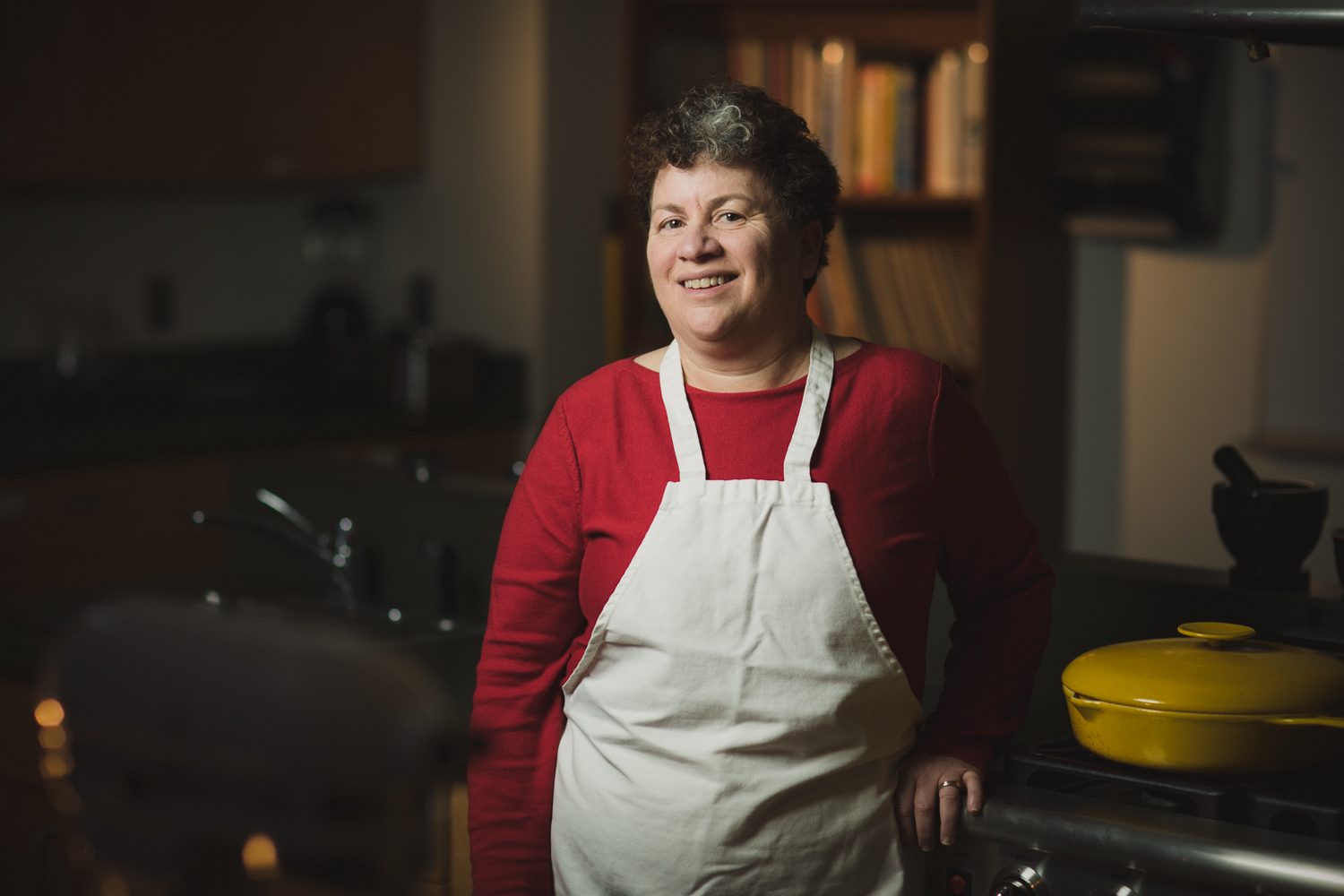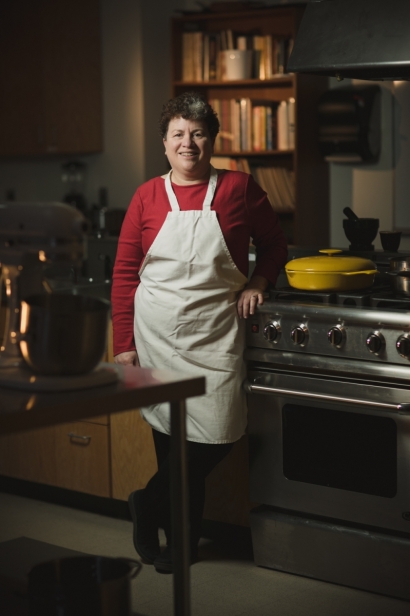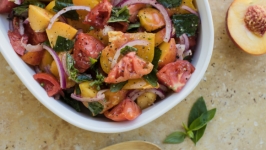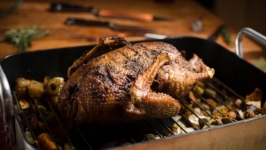Amy Trubek: Culinary Anthropologist
Amy Trubek was trained as a chef and anthropologist and is now an associate professor in the Department of Nutrition and Food Sciences at UVM. She also serves as the faculty director of the Food Systems graduate program. Trubek has written two books, The Taste of Place: A Cultural Journey into Terroir and Haute Cuisine: How the French Invented the Culinary Profession. Her third book, Making Modern Meals: How Americans Cook Today, will be published in November 2017.
Trubek lives in a 1791 farmhouse with her husband, Brad Koehler, and their daughter, Katherine. The family owns Windfall Orchard in Cornwall. Our conversation began on their stone patio overlooking acres of gnarled trees, with breathtaking views east to the Green Mountains.
Edible Green Mountains: Where did your journey in food begin?
Amy Trubek: I was always interested in cooking. In high school, I worked in a funky local restaurant and had a little catering business with a friend. I also worked as an apprentice at a French restaurant in Cambridge, Massachusetts, after college. I went to the Cordon Bleu culinary school in the late 1980s. I thought I would be a food writer.
EGM: So where does the cultural anthropology come in?
AT: I realized I wanted not just to work in food but to think about it. So I got my PhD from UPenn in cultural anthropology. My dis- sertation on French haute cuisine and why it dominated the history of the culinary profession became my rst book. After I nished my dissertation, I moved to Vermont in the fall of 1994 to teach at New England Culinary Institute. NECI was starting a bachelor’s degree and they hired me to teach food history. I taught there for eight years.
EGM: Then what?
AT: I received a Food and Society fellowship in 2002 sponsored by the Kellogg Foundation that was trying to build momentum for a food movement. eir goal was to bring in people of different educations and backgrounds to train others in writing and outreach about food and food systems. I also ran Vermont Fresh Network for a few years until I started at UVM in 2006. I was brought in to help create an integrated food systems curriculum. UVM has demonstrated a real commitment to teaching these kinds of courses.
EGM: Based on your research, do people consider food preparation an obligation, a burden or a form of nurturing?
AT: My focus has been on the actual practice rather than the politics of cooking: how people work with food, take the resources of the natural environment and transform them into palatable and pleasurable meals, and how those skills are transferred. My new book examines why we say cooking is in decline but then blame the food industry. It’s way more complicated than that, and moralizing won’t get us anywhere. If we want people to cook, we have to teach them to cook! And how do we teach people to cook in a way that ensures that they actually will cook rather than go for the frozen dinner or the takeout? Why aren’t more schools teaching cooking? We are almost inculcating a passivity and then complain about what happens, or doesn’t happen.
Cooking is a fluid and porous practice, not owned by women anymore. It’s not even an intrinsic obligation for the maintenance of domestic life. That has implications for intergenerational transfer of knowledge. But there have always been creative and inventive ways to learn how and where to cook, and who can teach us.
EGM: What’s your view on meal delivery services like Plated or Blue Apron?
AT: I’ve discovered through research that people don’t like to plan— they find planning burdensome. That probably explains the phenomenon of these services, with all the pre-measured ingredients in a box. The box shows up on your doorstep, all the thinking and shopping have been removed, and it’s instructional with just enough “chef-y” touches. I’m not sure yet, but this may be the bridge between the aspirational and reality.
EGM: What trends have you seen in Vermont’s culinary scene over the last two decades?
AT: At NECI in the ’90s, we were trying to build on what the back-to-the-landers had started. Farm-to-table is now our culinary cultural identity. The farm-to-school movement has also been very successful in teaching a whole group of young people to understand where their food comes from. And classes, demonstrations and events like Junior Iron Chef offer kids the opportunity to learn how to prepare it. But will these efforts trump all the other influences in their lives? It’s like any skill: If you don’t practice it regularly, you lose the knack.
Cultural values and practices last as long as we have a commitment to keeping them and transferring them to subsequent generations. Will farm-to-table endure? What about our reliance on processed foods and the food service industry? Neither is going away. We make these compromises every single day, between the idea of what we want and what we actually do.
EGM: Tell me about Windfall Orchard.
AT: We moved here in 2002. The orchard has 80 varieties of heirloom apples along with pears, plums, cherries and other small fruits. My husband, Brad, oversees the orchard and makes hard and ice cider and perry. We press the fruit here and process the juice into cider in collaboration with Eden Cider in Newport. We sell it under the Windfall Orchard label. We just designed and built a pizza oven with a friend and plan on doing pop-up dinners and other events here.
EGM: Influences in your own life?
AT: I loved reading M. F. K. Fisher and Calvin Trillin, food writing pioneers who explored food and how it impacts our human experience. Of course I loved Julia Child, and Brad and I love Yotam Ottolenghi’s bright saturated flavors. And since I’m a baker, I refer to Tartine. Laura Shapiro is a culinary historian and food journalist, and I enjoy her combination of scholarly and accessible writing. She challenges conventional wisdoms about how we think about food.
EGM: How do you cook at home?
AT: Brad is trained as a chef. We met at NECI where he was a chef instructor; he then worked at Middlebury College for many years. When I took the job at UVM, I became a commuter, and since he’s been working from home now with the orchard and cider business, he tends to handle more of the weekday cooking. But I still cook, both during the week and on the weekends. Where we are in our lives often determines when, why and how we cook.
EGM: An ideal weekend?
AT: On the weekends, we have our cider booth at the farmers’ market. But we make big meals and invite people over. One of my greatest pleasures is to imagine a meal and pull it together. Sharing a meal is one of the deepest ways to connect as humans.
FIVE RAPID FIRE
Breakfast today?
Oatmeal
Favorite childhood meal?
Feijoada, or Brazilian black beans and rice
Cake, pie or cookies?
Cake
Guilty pleasure?
Lots of pleasure but no guilt!
Midnight snack?
I don’t eat after dinner!
Maria Reade can vouch for the quality of both Amy’s writing and Brad’s hard ciders.










